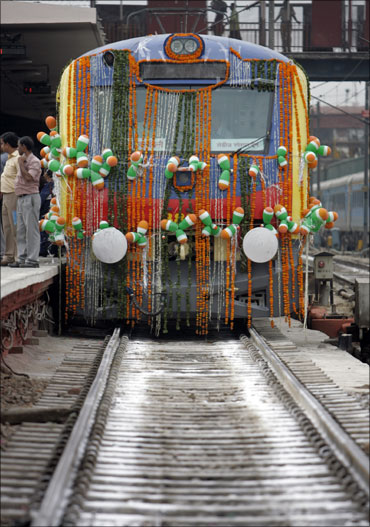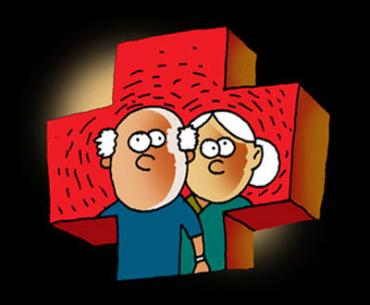 | « Back to article | Print this article |
How courts protected consumers in 2010
With unrelenting consumerism throwing up varied schemes aimed at fleecing citizens, 2010 saw consumer courts enhancing their proactive role to protect people, often by even enlarging the ambit of consumer protection law.
Imparting liberal interpretation to various provisions of the Consumer Protection Act, the consumer courts, ranging from those at district level to the National Consumer Disputes Redressal Commission, sought to effectively curb various forms of unfair monopolistic and deceptive trade practices, prevalent in the country.
While the Railways Act limits the government's liability of passengers' losses only over the booked baggage, the NCDRC made Indian Railways pay a compensation of Rs 50,000 to a passenger, who had lost his baggage during travel.
Quoting Railway Act provisions, the NCDRC ruled that while state-run monolith cannot be held liable for loss of unbooked baggage of the passengers, it can certainly be taken to task for its failure to handle efficiently and proactively the complaints of the passenger who lost his baggage.
Click NEXT to read on . . .
How courts protected consumers in 2010
In yet another ruling, it called the bluff of educational institutions forfeiting the entire fee of students, cancelling their admission to migrate to other institutions.
Acting on a complaint by a Jalandhar student, Sarvapreet Singh, that Ferozepur-based Lala Lajpat Rai College of Engineering and Technology had forfeited his entire fee for withdrawing his admission, the NCDRC dubbed the act of the college illegal and ordered it to refund major chunk of the fee after retaining its nominal administrative and processing charges.
It also took note of the growing dubious practices of doctors either putting up misleading advertisements to treat incurable diseases or making false claims about their educational and professionals qualifications to lure gullible patients and unequivocally censured such practices.
Upset by a case of a Kerala doctor luring patients with 'misleading' claims to treat cancer, the NCDRC held that such assurances amount to rendering deficient service and asked erring doctors to pay Rs 100,000 as compensation to a person for misguiding him on his son's cancer treatment, eventually leading to the youngster's death.
Click NEXT to read on . . .
How courts protected consumers in 2010
In another case, it imposed a fine of Rs 2.5 lakh (Rs 250,000) on a Meerut-based doctor for misleading patients through his false claims about his professional qualifications and held that such physicians are liable to be prosecuted for rendering deficient service.
Claiming that he had a master's in surgery, this doctor had operated upon a patient, permanently damaging one of his kidneys. Later, it transpired that he was merely an MBBS.
On December 5, the NCDRC gave a ruling, asking various airlines to be extra vigilant and little more careful while handling their passengers, especially senior citizens.
The NCDRC gave this ruling while ordering Dutch airliner KLM to pay a compensation of Rs 50,000 to a senior Indian citizen for subjecting him to 'a host of hassles' during his flight to Seattle from Delhi in 2006.
Click NEXT to read on . . .
How courts protected consumers in 2010
In yet another ruling, the consumer court sought to enforce the concept of market value of a property, contrary to its official run-down value that the government often takes for determining the worth of pieces of land to acquire them under the Land Acquisition Act.
The Delhi State Consumer Commission sought to enforce the practical concept, while ordering a real estate firm to pay the market value of a flat to the legal heir of a woman for its failure to allot the residential unit to him, despite fulfilment of all legal requirements.
The woman had died after booking the flat. Fearing the builder will not be able to allot it in her lifetime, she had performed all requisite legal formalities to ensure that the flat is handed over to one of her kin.
In another ruling, the NCDRC took note of cases of banks often demanding more than their actual dues from their borrowers despite the latter having settled their loans and ruled it to be 'an unfair trade practice'.
Click NEXT to read on . . .
How courts protected consumers in 2010
On November 15, the NCDRC held that banks which demand money despite having received full and final amount of the loan from the borrowers is an 'unfair trade practice' and are liable to be prosecuted for rendering deficient service.
The NCDRC gave the ruling while directing banking major HSBC to pay damages to one of its borrowers for harassing him and trying to extract more than what was due to it.
In its another significant ruling on November 12, the NCDRC held that an insurance policyholder cannot be denied compensation merely because his vehicle had some passengers beyond its seating capacity at the time of the accident.
And in another ruling on December 12, it held that a prior agreement between two parties to have their disputes resolved through arbitration does not bar them from seeking redressal of their grievances under the Consumer Protection Act.
This was indeed a ruling aimed at expanding the ambit of the Consumer Protection Act.




